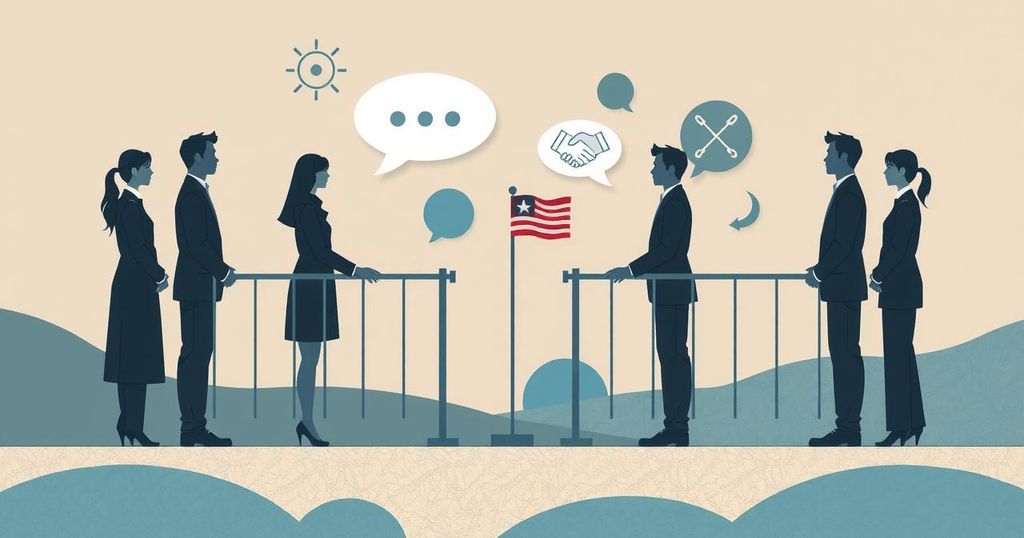World news
AFRICA, ANGOLA, BE, BEHALAL, CIVIL WAR, CONFLICT RESOLUTION, CONGO, CONGO (KINSHASA), CONGO RIVER ALLIANCE, DEMOCRATIC REPUBLIC OF CONGO, EUROPEAN UNION, GLOBAL INITIATIVE AGAINST TRANSNATIONAL ORGANIZED CRIME, HUMANITARIAN, KINSHASA, LUANDA, MILITARY COUP, NORTH AMERICA, REUTERS, TS, TSHISEKEDI, UNITED STATES, WAR, WEST AFRICA, ZOBEL BEHALAL
Marcus Chen
0 Comments
M23 Rebels Withdraw from Peace Talks Following EU Sanctions
M23 rebels withdrew from peace talks with the DRC government due to EU sanctions. The sanctions were deemed obstructive by the M23, which has faced military setbacks leading to increased urgency for dialogue. Despite this setback, the Congolese government will still attend the talks in Angola. The conflict, rooted in historical issues and resource competition, has escalated significantly, drawing international criticism and accusations against Rwanda.
On Monday, the M23 rebels, supported by Rwanda, withdrew from impending peace talks with the Democratic Republic of Congo’s government, shortly before their scheduled meeting in Angola. The rebel alliance cited European Union sanctions imposed earlier that day against M23 and Rwandan officials as the primary reason for their withdrawal. The Congo River Alliance stated that these sanctions are designed to “obstruct the much-anticipated talks.”
Previously, M23 has sought direct negotiations with the Kinshasa government, but Congo’s President, Felix Tshisekedi, had been resistant, labeling M23 as a proxy for Rwanda. However, following military setbacks, Tshisekedi had agreed to a delegation’s attendance in Luanda. Despite M23’s withdrawal, government spokesperson Tina Salama confirmed that they would still send a delegation in response to the mediators’ invitation.
The ongoing conflict, which traces its roots to the aftermath of the Rwandan genocide and the competition for natural resources, has escalated dramatically since January, resulting in the capture of two major cities and significant civilian casualties. The international community, notably the United Nations, has accused Rwanda of supporting M23 with arms and troops, while Rwanda insists its actions are defensive against hostile groups within Congo.
The EU sanctions against M23 and Rwanda are considered some of the most stringent to date, targeting entities involved in resource extraction. Zobel Behalal, an expert at the Global Initiative against Transnational Organized Crime, highlighted that the sanctions specifically addressed Rwanda’s mining sector and associated revenues, reflecting the intertwined nature of the resources and the ongoing conflict.
In their statement, M23 criticized the sanctions as incomprehensible, which undermine chances for direct dialogue and negotiation. In a related diplomatic conflict, Rwanda severed ties with Belgium, expelling its diplomats following Belgium’s calls for greater EU action against Rwanda.
Belgium’s Foreign Affairs Minister described Rwanda’s response as disproportionate, indicating that tensions surrounding the situation continue to escalate on both diplomatic and military fronts.
In summary, the M23 rebels’ withdrawal from peace talks with the Democratic Republic of Congo underscores the impact of recent EU sanctions on diplomatic efforts aimed at resolving a long-standing conflict rooted in historical grievances and resource competition. With ongoing tensions between Rwanda and Belgium, as well as significant military developments in eastern Congo, the prospects for peace remain uncertain. Despite the withdrawal, the Congolese government intends to participate in the peace talks, emphasizing the complexities involved in achieving a potential resolution.
Original Source: www.newsbreak.com




Post Comment